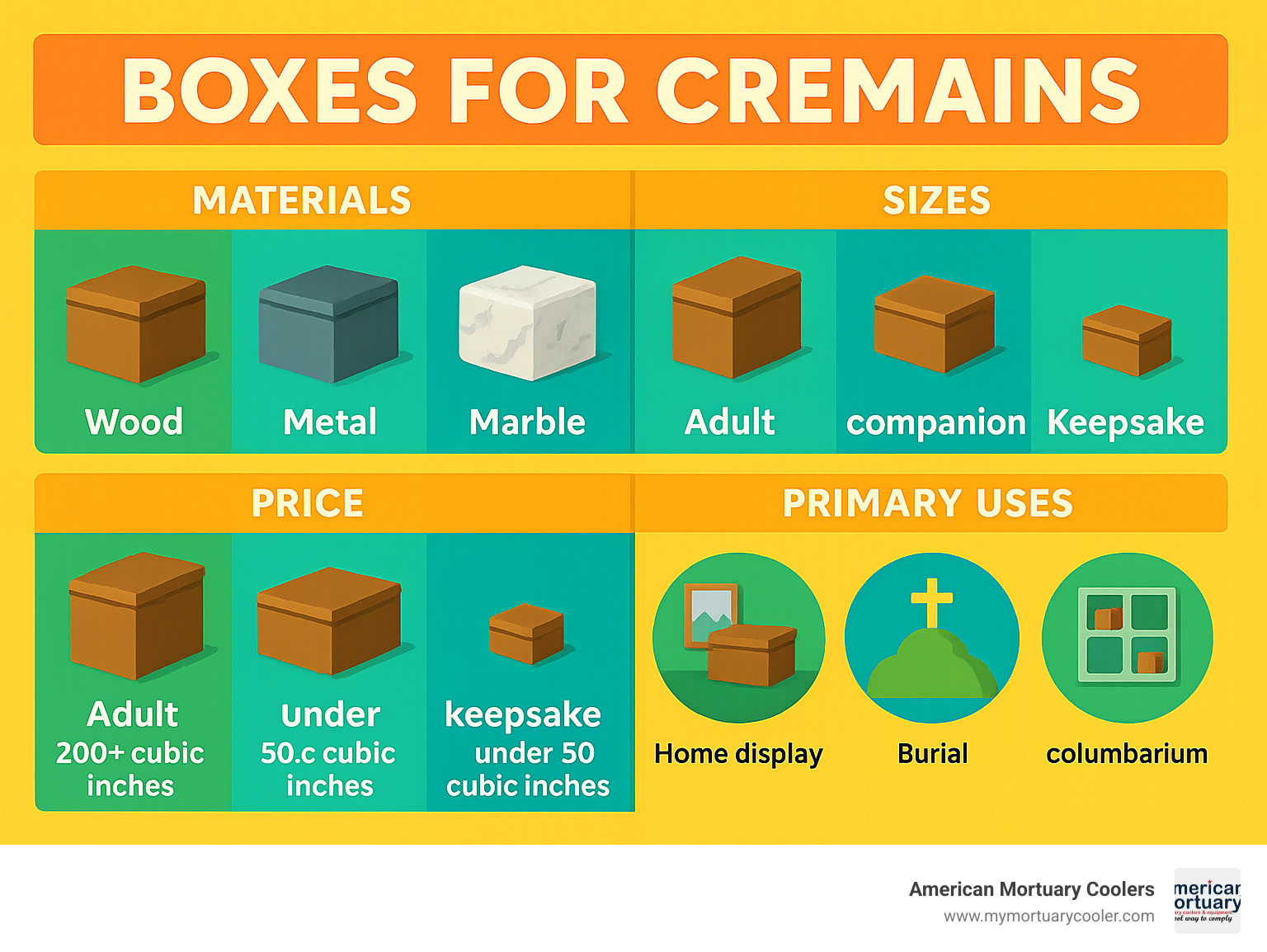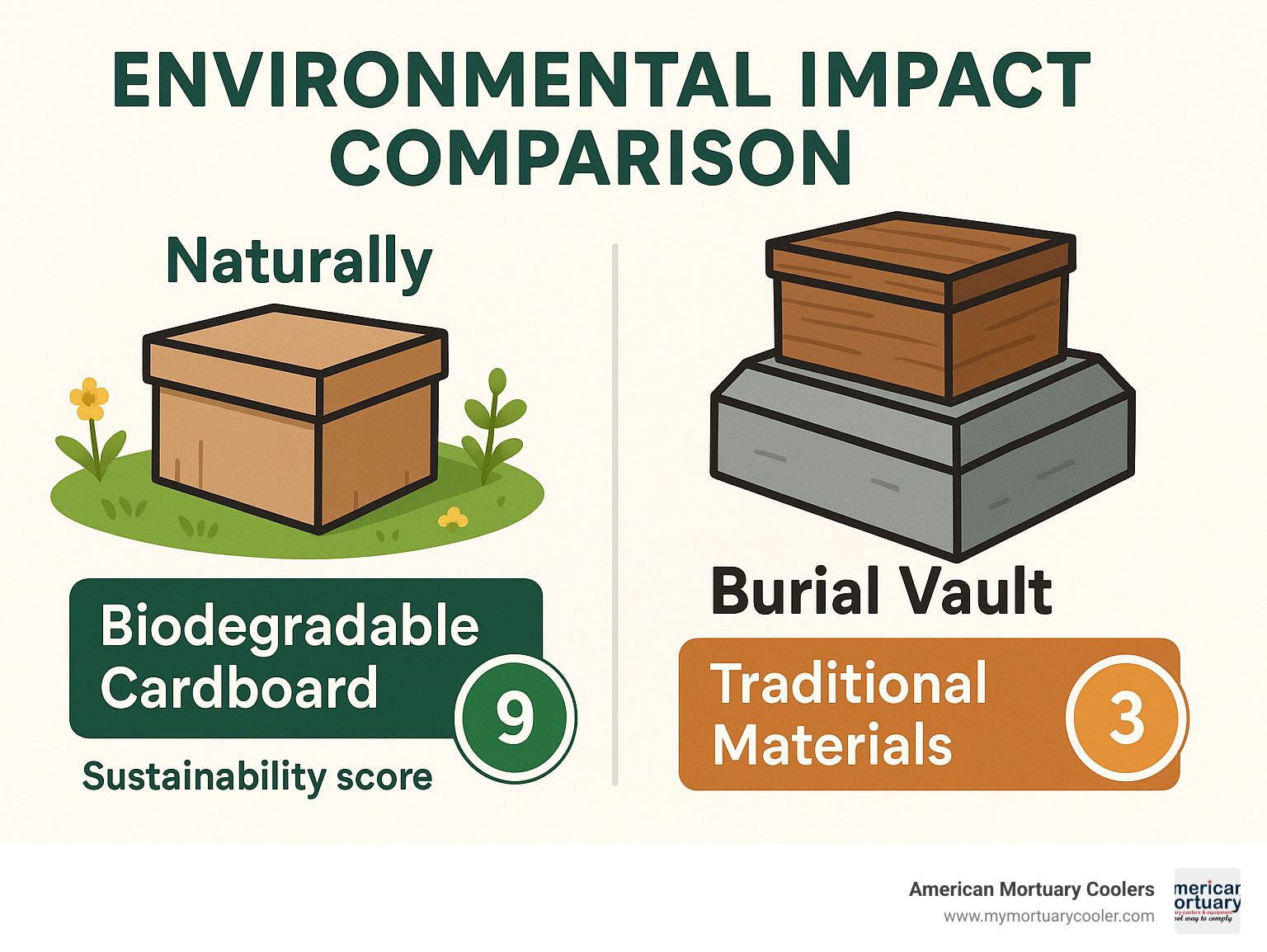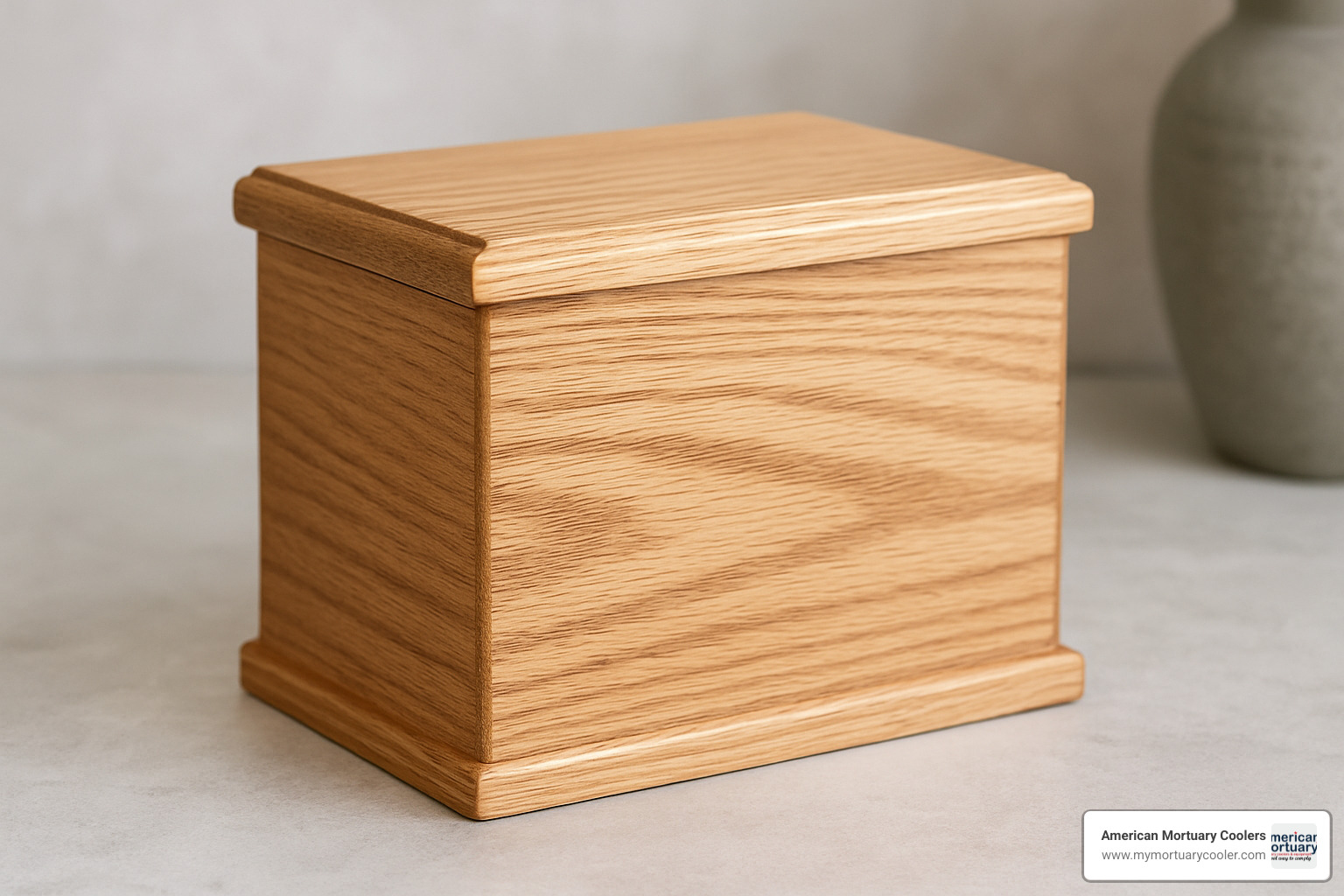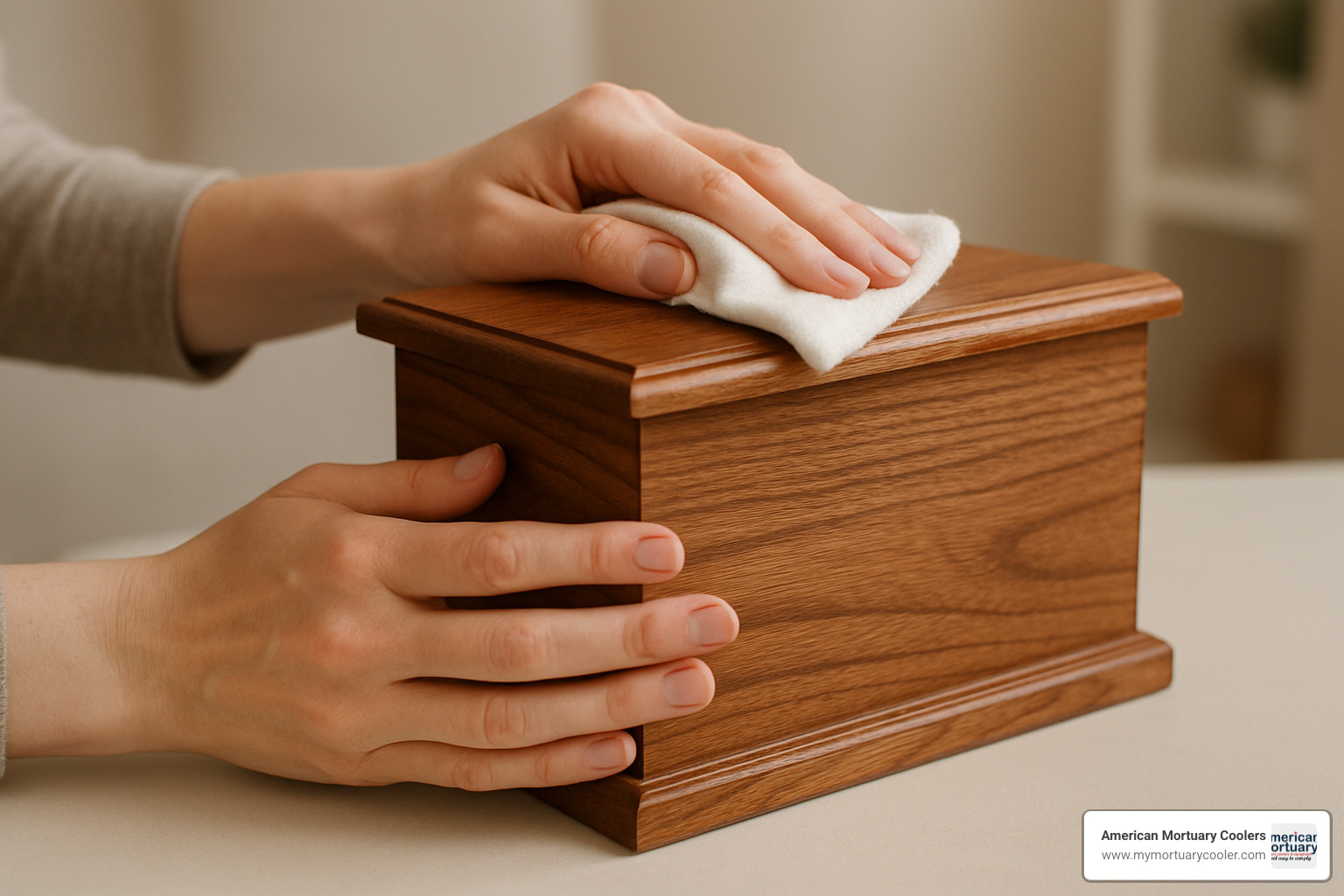
A Comprehensive Guide to Choosing Boxes for Cremains
Why Choosing the Right Container for Cremains Matters More Than Ever
Boxes for cremains have become increasingly popular as cremation rates now exceed 50% across North America, creating new demand for containers that honor loved ones while fitting modern lifestyles and values.
Quick Answer for Boxes for Cremains:
- What they are: Rectangular or square containers designed to hold cremated remains
- Key difference from urns: Box shape vs. traditional vase shape - better for display and niche placement
- Standard sizes: Adult (200+ cubic inches), Companion (400+ cubic inches), Keepsake (<50 cubic inches)
- Materials: Wood, metal, marble, biodegradable cardboard, stone, glass
- Price range: $59-$400+ depending on material and customization
- Uses: Home display, burial, columbarium placement, scattering ceremonies, transport
Modern families want memorial options that blend seamlessly with home décor while respecting the deceased's wishes. Unlike traditional vase-shaped urns, cremation boxes offer a less ornate aesthetic that fits naturally on bookshelves, mantels, or in cemetery niches.
The growing interest in environmental sustainability has sparked demand for biodegradable options made from recycled cardboard or organic materials. Personalization trends mean families increasingly seek custom engraving, photo inserts, and themed designs that reflect their loved one's personality.
I'm Mortuary Cooler, and through years of working with funeral directors nationwide, I've seen how the right boxes for cremains can provide both practical solutions and emotional comfort during difficult times. This guide will help you steer the options, regulations, and considerations to make the best choice for your specific needs.

Essential boxes for cremains terms:
Why This Guide Matters
Modern families face unique challenges when selecting memorial containers. We've witnessed a significant shift in how people approach end-of-life planning, with cost clarity, sustainability concerns, and emotional healing taking center stage. The funeral industry has responded by expanding beyond traditional offerings, providing thousands of designs, materials, and customization options.
What Are Boxes for Cremains?
Boxes for cremains emerged from families seeking alternatives to traditional memorial containers. While ancient civilizations used ornate vase-shaped urns, modern cremation boxes developed from a practical need: families wanted containers that felt less formal and fit better into everyday life.
The rectangular design addresses real problems. Funeral directors noticed families struggled with where to place traditional urns in their homes. Round, vase-shaped containers demanded attention and required special spots. Boxes for cremains, with their clean lines and stable base, sit naturally on bookshelves next to family photos or rest quietly on mantels without overwhelming the space.
These containers serve as both temporary and permanent solutions. Some families use them while deciding whether to scatter, bury, or keep remains at home. Others choose boxes as the final resting place because they prefer the understated dignity over ornate options.
Practical advantages include niche-friendly design for cemetery columbariums and TSA compliance for families who need to travel with remains. The rectangular shape and secure closure make them easier to inspect and transport than curved urns.
Key Differences Between Boxes for Cremains and Traditional Urns
The shape difference goes beyond appearance. Traditional urns often tip over easily and require careful placement. Boxes sit firmly on any flat surface and won't roll or wobble. This stability matters when dealing with something so precious.
Capacity standards work more logically with boxes. The funeral industry uses the rule of one cubic inch per pound of body weight, and rectangular containers accommodate this calculation efficiently. Display versatility represents the biggest advantage - a wooden cremation box blends seamlessly with books, while a marble box adds elegance without dominating the space.
For more detailed information about container options, see our guide on urn vs vault differences.
Choosing the Right Size of Boxes for Cremains
The one cubic inch per pound rule provides your starting point, but we recommend adding 10-20% extra capacity for the temporary container plus any small mementos you might include.
Adult boxes typically hold 200-240 cubic inches, companion boxes offer 400-480 cubic inches for couples, and keepsake boxes under 50 cubic inches serve families who divide ashes among relatives. For pets and infants, the same sizing principles apply with special consideration for appropriate proportions.
Materials, Capacities & Environmental Impact
When selecting boxes for cremains, the material you choose impacts both durability and environmental considerations. Wood remains the overwhelming favorite - cherry symbolizes renewal, walnut represents strength, pine offers affordability, while exotic hardwoods create unique memorials.
Metal boxes for cremains bring different advantages. Brass develops gorgeous natural patina over time, stainless steel maintains its appearance indefinitely, and bronze offers timeless elegance. These materials resist moisture, insects, and general wear.
The environmental movement has revolutionized memorial containers. Biodegradable options include recycled cardboard boxes with non-toxic adhesives that return to earth naturally when buried. Innovative manufacturers craft containers from bamboo, compressed organic matter, or reclaimed whiskey barrels.

Wood, Metal & Stone: Pros and Cons
Wooden boxes for cremains are gorgeous but need care. Humidity changes can cause cracking, and direct sunlight fades finishes. The quality gap is significant - mass-produced containers barely survive shipping, while handcrafted alternatives feature perfect joinery.
Metal boxes excel where wood struggles. Brass containers outlast generations, developing character through natural patina. Stainless steel maintains mirror finishes indefinitely. However, metal boxes weigh 2-3 times more than wooden alternatives and often require burial vaults.
Stone and marble represent premium options - absolute permanence with intricate carved details. These materials create museum-quality memorials but are heavy, expensive, and require careful handling.
Biodegradable & Cardboard Options
Environmental consciousness has sparked innovation in boxes for cremains. Cardboard boxes work beautifully for scattering ceremonies - families can release both ashes and container together, with the box dissolving within months.
For families considering water ceremonies, our guide on biodegradable urns for sea scattering provides detailed information about eco-friendly options.
Manufacturing innovations include boxes from recycled whiskey barrels and agricultural waste products, changing garbage into meaningful memorials that return nutrients to soil.
Size & Capacity Cheat-Sheet
The industry standard of one cubic inch per pound of body weight provides your starting point, but add 10-20% extra capacity for comfortable fit.
Adult standard boxes (200-240 cubic inches) accommodate most individuals, companion boxes (400-480 cubic inches) serve couples, and keepsake sizes (3-50 cubic inches) let multiple relatives keep portions. Airline regulations restrict carry-on containers to approximately 22" x 14" x 9", and most standard cremation boxes meet these requirements.
Using and Personalizing Your Box
Boxes for cremains offer remarkable versatility in use and placement. Home display works beautifully because these containers blend seamlessly with existing décor, sitting quietly on mantels or bookshelves rather than dominating rooms like traditional urns.
Cemetery burial accommodates up to three urns in a single plot, even with existing casket burials. Columbarium placement requires measuring niches first - standard dimensions around 12" x 12" x 12" vary between facilities. For scattering ceremonies, boxes provide dignified transport to meaningful locations.
Customization Ideas for Boxes for Cremains
Boxes for cremains excel at personalization. Laser engraving offers incredible precision for names, dates, quotes, or detailed imagery. Photo inserts protected by glass preserve cherished memories permanently. Religious symbols provide spiritual comfort, while military emblems honor service members.
Hobby themes celebrate life passions - fishing motifs for anglers, musical notes for musicians, gardening designs for green thumbs. These personal touches transform containers into storytelling pieces.

Cost Breakdown & Factors
Material grade creates the biggest price variation - basic pine boxes start around $59, while exotic hardwoods or premium metals exceed $400. Craftsmanship level matters significantly, with hand-crafted pieces providing superior quality over machine-made alternatives.
Customization adds expense but multiplies emotional value. Simple engraving adds $25-50, while complex photo inserts can double base prices. Retailer markup varies dramatically - funeral homes charge 200-300% above wholesale, while online retailers offer competitive pricing.
Transfer Process & Professional Help
Cremated remains arrive in sealed plastic bags inside temporary containers. Most funeral directors offer transfer services, ensuring proper handling with appropriate dignity. For families handling transfers themselves, many cremation boxes include plastic inserts designed to accommodate original bags perfectly. Tamper-evident seals provide security and legal compliance.
Regulations, Purchasing Channels & Care
Understanding regulations prevents unexpected surprises. Cemetery requirements vary dramatically - municipal, private, and religious facilities follow different guidelines. Niche dimensions in columbaria range from 10-inch cubes to 15-inch spaces, so always measure before buying.
Burial vault mandates protect cemetery grounds from settling, typically required for non-biodegradable containers, adding $200-500 to costs. Biodegradable boxes for cremains often bypass this requirement.
Air travel requires containers made from plastic, cardboard, or wood - metal and marble cannot pass X-ray machines. You need cremation certificates and content description letters. Postal regulations allow USPS Priority Mail Express only.
Where to Buy
Funeral homes offer convenience and professional guidance but with premium pricing - markups often double wholesale costs. Online retailers provide extensive selections at competitive prices with customization tools and customer reviews.
Independent artisans create unique, handcrafted pieces with exceptional craftsmanship, though production times may extend several weeks. For comprehensive guidance, see our Ultimate Guide to Cremation Urns for Sale.
Long-Term Care & Maintenance
Proper care ensures boxes for cremains maintain beauty for generations. Wood containers need periodic treatment with appropriate oils to prevent cracking. Humidity control (30-50% relative humidity) prevents warping and joint separation.

Metal containers require minimal maintenance. Brass develops attractive natural patina, while stainless steel maintains appearance indefinitely. Regular dusting with soft, lint-free cloths keeps all materials looking their best.
Frequently Asked Questions about Boxes for Cremains
Do I Need a Burial Vault for a Box?
Usually yes, depending on material and burial location. Most cemeteries require vaults for wooden, metal, and stone boxes to prevent ground settling as materials deteriorate. Cemetery vault requirements typically cost $200-800 but protect your memorial investment long-term.
Biodegradable boxes designed for earth burial often don't need vaults since they're meant to return naturally to earth.
Can These Boxes Be Used for Pets or Infants?
Absolutely. Pet cremation boxes feature themed designs from paw prints to breed-specific artwork. Sizing follows the one cubic inch per pound guideline, with most pet boxes starting at 25 cubic inches minimum.
Infant containers require special sensitivity in design and sizing, often featuring gentle colors, angel motifs, or simple designs that provide comfort during incredibly difficult times.
How Do I Travel by Air with Cremains?
Air travel with boxes for cremains requires planning. Material restrictions are strict - containers must be plastic, cardboard, or wood. Metal and marble cannot pass X-ray machines.
Documentation is essential - you need official cremation certificates and letters explaining container contents. Most standard cremation boxes meet carry-on size requirements, but verify specific airline policies and contact carriers 24 hours before flying.
Conclusion
Finding the right boxes for cremains becomes more than a practical decision - it's about creating comfort during life's most difficult chapters. Whether you choose eco-friendly cardboard boxes that return naturally to earth or handcrafted wooden containers that become gentle daily reminders, the choice comes down to what feels right for your family.
These containers transform into focal points for memories, conversation starters about beloved family stories, and tangible connections to people who shaped our lives. The funeral industry continues evolving with new materials and customization options, yet the heart remains unchanged - helping families find dignity and meaning during loss.
At American Mortuary Coolers, we've seen how the right choice brings lasting peace. Whether you select a simple pine box for $59 or invest in a custom hardwood design approaching $400, what matters is that it reflects your loved one's spirit and your family's values.
If you're drawn to truly personalized options, our guide on Custom Urns: Creating a Unique Tribute offers additional inspiration for creating something uniquely meaningful.
The boxes for cremains you choose will serve your family well, but the love, memories, and connections you shared are what truly matter. Trust your instincts, choose with confidence, and know that your thoughtful selection honors both your loved one and your family's path forward.



